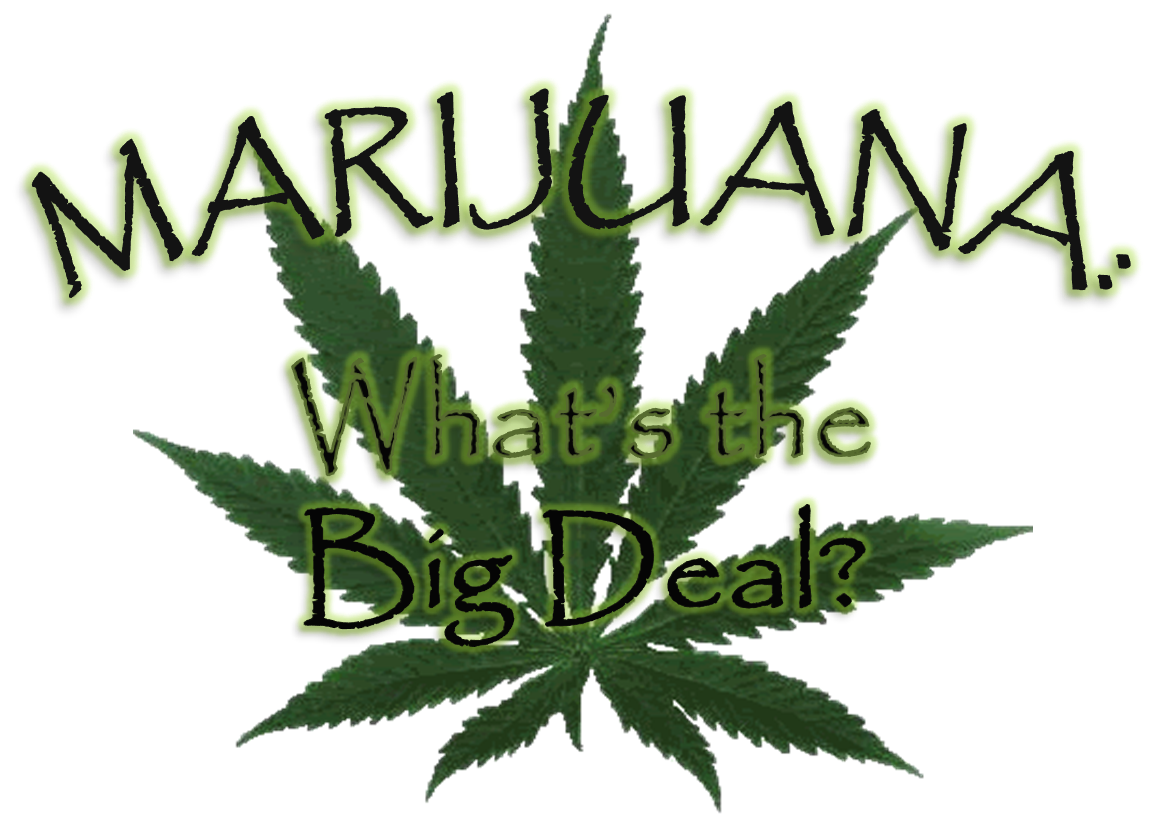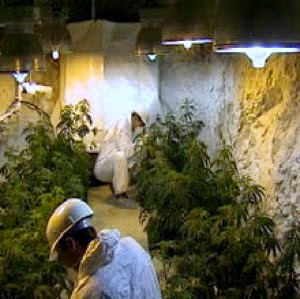Our Confused Legal Situation
1) Preamble
Marijuna ("weed"or "pot") is a general term for the leaves and/or buds of the cannabis sativa ("marijuana") hemp plant. It is usually used and inhaled like a cigarette ("joint") or in small pipe. It is sometimes smoked in an emptied cigar to make a "blunt"with a cigar flavor. The major active ingredient in marijuana (cannabis) is tetrahydrocannabinol or THC.

Hashish (or hash oil) is solid or resinous depending on the processing of the resin of the cannabis flowers and is more potent than marijuana. It is consumed by being heated in a pipe, hookah, bong, bubbler, vaporizer, or hot knife. It may be mixed with cannabis buds or tobacco and smoked in joints, or smoked as bottle tokes ("brewing bots", "bucket bongs"). It is the active ingredient in "pot" cookies or brownies or cooked in various foods.
- began with the Opium Act of 1908
- followed by the Opium Drug Act of 1911, which outlawed the sale or possession of
implication heroin) and cocaine.
2) Cannabis was added 1923
The Confidential Restricted List in 1923 under the Narcotics Drug Act Amendment Bill added other unidentified drugs and was understood to include cannabis (although not identified by name). This has since been taken as including marijuana as a narcotic.
Since then Marijuana has been "officially" classified as a narcotic and treated as such for legal matters (e.g. border crossing) in spite of it having little in common with actual narcotics.
The following discussion was taken from a recent Canadian reality TV show "Border Security":
Border Officer: "Have you used any kind of narcotic in the last 6 months?"
Traveller: "No sir."
. . . after several unrelated questions . . .
Border Officer: "Have you used marijuana in the last 6 months?"
Traveller: "A couple of times."
Border Officer: "We have a problem. You lied to me when you said you hadn't used a narcotic."
Lying to a Border Official is adequate reason to launch an intensive search, and arguing is not a good option because in his book, Marijuana is listed as a narcotic.
3) Marijuana as a sociological phenomenon
It has been discussed in many books and college texts such as "Panic and Indifference" |
| Internet websites list the most "marijuana friendly" campuses |
- Cannabis was added of the Opium and Narcotic Drug Act in 1923, before cannabis was identified as a social issue in Canada -- - a "solution without a problem" (p. 179).
- The first seizure of marijuana cigarettes occurred in 1932, nine years after the law passed (p. 182)
There are several accredited US "marijuana universities" which offer degree courses and degrees in drugs including marijuana such as:
-Oaksterdam University in Oakland, California offers a full slate of Cannabis related courses
- Clover Leaf University (Colorado) has state approval for 16 stand-alone course and 4 full medical marijuana certifications.
Report of Senate Committee (2001/2002):
Number of reported marijuana offenses in Canada (1999) were 35,000
Number of reported marijuana offenses in Canada (2001) were 71,600
Estimated number of marijuana users in Canada (2002) was 2.3 million
Sabeena Ahmed wrote an excellent Canadian essay "THE LEGALIZATION OF MARIJUANA" (Sept 2003) for her third-year University of Toronto University sociology course. Her conclusion is:
"it is in the researcher's opinion that the present Canadian law tends to "over-criminalize" marijuana and alternative policies dealing with the legislation of marijuana need to be considered that deal with the "marijuana problem" more realistically."
- A Canada-wide Health Promotion Directorate was established to include an anti-drug campaign promoting that "kids shouldn't try marijuana or hashish until they are at least 18, and mature enough to decide responsibly" and should "stay real". This mild approach impressed even pro-marijuana groups like the National Organization for the Reform of Marijuana Laws (NORML).
 - 2002 the Government of Canada gave a four-year contract to a Saskatoon-based company for the production of medicinal marijuana. Prairie Plant Systems, used an inactive underground copper/zinc drift owned by the Hudson Bay Mining and Smelting to produce approximately 400 kilograms of medicinal marijuana annually. Because marijuana plants and seeds were illegal the company used whatever seeds the RCMP had confiscated in drug busts with no concern for quality or strain of marijuana. The result was an expensive and poor quality product which was inadequate for medicinal use. When the operation closed in 2009 more than 1,400 Canadians were authorized to possess marijuana for medical purposes. Of those, about 300 people received the Prairie Plant Systems product. The others used "illegal" privately grown Marijuana.
- 2002 the Government of Canada gave a four-year contract to a Saskatoon-based company for the production of medicinal marijuana. Prairie Plant Systems, used an inactive underground copper/zinc drift owned by the Hudson Bay Mining and Smelting to produce approximately 400 kilograms of medicinal marijuana annually. Because marijuana plants and seeds were illegal the company used whatever seeds the RCMP had confiscated in drug busts with no concern for quality or strain of marijuana. The result was an expensive and poor quality product which was inadequate for medicinal use. When the operation closed in 2009 more than 1,400 Canadians were authorized to possess marijuana for medical purposes. Of those, about 300 people received the Prairie Plant Systems product. The others used "illegal" privately grown Marijuana.- 2013 there were 28,000 people in Canada who held a personal-use or designated operation production license under the MMAR (Marijuana Medical Access Program Regulations. This program ended Mar 31, 2014.
- March 2014 commercial producers began being licensed across the country under the MMPR (Marajuana for Medical Purposes Regulations) with amendments (2014).
Amendment As of Sept. 2014 thirteen sites have been licensed. They are big business operations. For example, Bonify Medical Cannabis in Winnipeg invested a million dollars and has 2 growers in hopes of receiving a license.
"Dried marijuana is not an approved drug or medicine in Canada. The Government of Canada does not endorse the use of marijuana, but the courts have required reasonable access to a legal source of marijuana when authorized by a physician".
At the same time, Health Canada is not able to control legal (but possibly harmful) drugs. What hope is there that they will be able to deal with the situation surrounding Cannabis?
(6) CANNABIS LEGALITY IN CANADA (and USA)
(a) Federal
Federal regulations as of 2014-09-01 are found listed under "Narcotic Control Regulations"
2014 Federal Government website official position is: "Dried marijuana is not an approved drug
or medicine in Canada".
(b) Provincial
Provincial laws and regulations in some cases seem to defy the Federal position.
In some jurisdictions police are not enforcing the laws, leading to an understanding that it is legal..
New regulations for medical marijuana come into effect in Canada on April 1, 2014,
but licensed home growers are allowed to continue to produce their own pot pending a future trial.
(c) USA
* "decriminalized " means the offense is like a parking ticket - a fine but no legal action or record.
Provincial laws and regulations in some cases seem to defy the Federal position.
In some jurisdictions police are not enforcing the laws, leading to an understanding that it is legal..
New regulations for medical marijuana come into effect in Canada on April 1, 2014,
but licensed home growers are allowed to continue to produce their own pot pending a future trial.
(c) USA
- States with legalized cannabis: Washington, Colorado
- States with legal medical cannabis - Washington, Oregon, Nevada, California, Montana, Arizona, New Mexico, Colorado, Minnesota, Illinois, Michigan, Hawaii, Alaska, New Hampshire, Vermont, Massachusetts, New York, Maine, Rhode Island, Connecticut, New Jersey, Delaware, Maryland Washington D.C.
- States with decriminalized* cannabis possession laws: Oregon, Nevada, California, Colorado, Arizona, New Mexico, Nebraska, Minnesota, Mississippi, Ohio, Virginia, Alaska, New York, North Carolina, Rhode Island, New Jersey
* "decriminalized " means the offense is like a parking ticket - a fine but no legal action or record.
***
Cannabis In Main Stream Canadian /USA Society
For The Do-It-Yourself Enthusiast
*********


